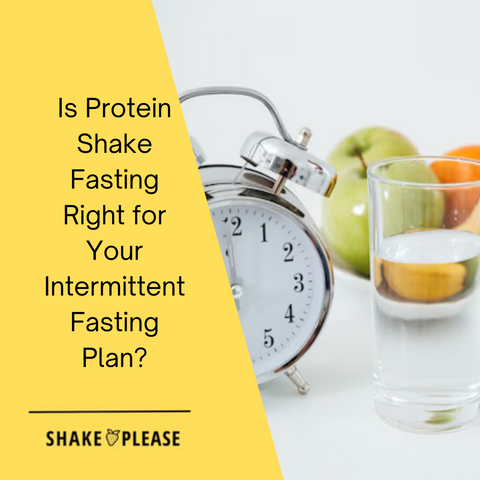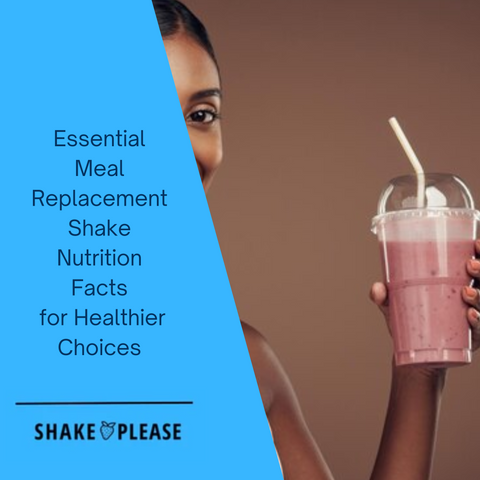
What is Intermittent Fasting?
Intermittent fasting, or an intermittent fast, is an eating pattern that cycles between periods of eating and fasting, with the goal of promoting weight loss, improving metabolic health, and potentially increasing longevity. Some popular methods of intermittent fasting include:
-
16/8: Fasting for 16 hours, with an 8-hour eating window.
-
5:2: Eating normally for five days a week, and restricting calorie intake for two days.
-
Alternate-day fasting: Alternating between fasting and eating days.
Intermittent fasting can be adjusted to fit individual needs and goals, but it’s important to consult a healthcare provider before starting any fasting regimen, especially if you have underlying health conditions.
The Role of Protein Shakes in Fasting
Protein shakes can play a valuable role in an intermittent fasting plan, particularly during the eating and fasting window. Here’s how they can be beneficial:
-
Convenience: Protein shakes offer a quick and convenient way to consume essential nutrients without breaking your fast. They are easy to prepare and can be consumed on the go.
-
Appetite Control: Protein shakes can help control hunger and provide a feeling of fullness, which is particularly helpful when you’re in a calorie deficit or need to manage appetite during eating windows.
-
Muscle Support: If your goal is to maintain or build muscle while fasting, protein shakes are an excellent supplement. They provide the necessary protein for muscle growth and repair, especially when you’re limiting calorie intake.
-
Meal Replacement: Protein shakes can serve as a meal replacement, offering a balanced mix of nutrients while staying within your calorie goals.
However, it’s crucial to choose a high-quality protein shake that is low in sugar and artificial sweeteners. Many commercial shakes are packed with additives that can spike insulin levels, which may interfere with the fasting benefits. Opt for only protein shakes that contain natural ingredients, and make sure they provide adequate protein without excess sugars or fillers.
What is Intermittent Fasting?
Understanding the Basics
Intermittent fasting is an eating pattern that involves alternating periods of eating and fasting. It’s a popular approach to weight loss, improved metabolic health, and increased longevity. During the fasting and eating period between, the body is forced to switch from relying on glucose for energy to relying on stored fat, which can lead to weight loss and improved insulin sensitivity. This metabolic switch not only helps in shedding extra pounds but also enhances the body’s ability to manage blood sugar levels, making it a powerful tool for overall health improvement.
Different Methods of Intermittent Fasting
There are several methods of intermittent fasting, each with its unique approach to managing calorie intake:
-
16/8: This method involves fasting for 16 hours and eating within an 8-hour window. It’s one of the most popular and easiest to follow, as it often aligns with natural eating patterns.
-
5:2: This approach involves eating normally for five days of the week and restricting calorie intake to 500-600 calories on the other two days. It allows for flexibility and can be easier to maintain over the long term.
-
Alternate-day fasting: This method alternates between days of normal eating and days of calorie restriction or complete fasting. It can be more challenging but is effective for those who can handle more extended fasting periods.
Each method can be tailored to fit individual lifestyles and goals, making intermittent fasting a versatile and customizable approach to health and weight management.
Can You Drink Smoothies During Intermittent Fasting?
Why Consider Protein Shakes?
Protein shakes can be a convenient and effective way to support muscle growth and recovery during intermittent fasting. They can be consumed during the eating window to help meet daily protein needs and support muscle protein synthesis. Additionally, protein shakes can be used as a meal replacement or supplement to the diet to help control hunger and support weight loss.
Incorporating protein shakes into an intermittent fasting regimen can help support muscle mass and weight loss, while also providing essential amino acids and nutrients. It’s essential to choose a protein shake that is low in calories and sugar and made with high-quality protein sources such as whey, casein, or plant-based proteins. When consuming protein shakes during intermittent fasting, it’s crucial to consider the timing and ensure that they are consumed within the eating window to lose weight and avoid breaking the fast.
By incorporating protein shakes into your intermittent fasting plan, you can enjoy the health benefits, of muscle maintenance, appetite control, and convenient nutrition. However, it’s essential to consult with a healthcare professional or registered dietitian to determine the best approach for your individual needs and goals.
Does Consuming a Protein Shake Break a Fast?
The question of whether consuming a protein shake during a fasting period breaks the fast depends on several factors, including the type of fasting protocol you're following higher protein intake, and the composition of the protein shake.
Impact on Insulin and Fat Burning
-
Insulin Response: Protein shakes typically contain amino acids that can trigger an insulin response, especially if the shake contains a significant amount of protein or carbohydrates. Elevated insulin levels can interrupt the fasting state and prevent your body from burning stored fat for energy. As a result, consuming a protein shake during a fasting period can technically break the fast in this regard.
-
Small Amounts of Protein: Some studies suggest that consuming small amounts of protein (around 10-15 grams or less than 50 calories) may not significantly spike insulin levels or break the fast. This might be particularly relevant for people practicing intermittent fasting for reasons like muscle maintenance rather than purely for fat loss.
Consider the Fasting Protocol
-
Strict Fasting Protocols: If you're following a strict fasting regimen (such as water fasting or a strict 16/8 intermittent fasting cycle), even a small amount of protein may break the fast. This is especially true if your goal is to maximize fat-burning or to allow your body to enter deeper metabolic states, like autophagy.
-
Modified Fasting Protocols: On the other hand, if your intermittent fasting plan allows for small caloric intake or emphasizes muscle preservation, consuming a protein shake may not be a major concern. It could even support your goals by providing the necessary nutrients during the eating window without derailing fat loss entirely.
Ingredients Matter
-
It's also important to consider the specific ingredients in your protein shake. Many protein powders contain added sugars, artificial sweeteners, or carbohydrates that can cause an insulin spike and break the fast. Opt for shakes that are low in sugar and artificial additives and made with clean, high-quality ingredients.
In conclusion, while consuming a protein shake during a fasting period can break the fast by triggering an insulin response, smaller, well-formulated protein shakes while fasting may be less disruptive, especially if you're focusing on muscle preservation or following a more flexible fasting protocol. Always consider your fasting goals, the ingredients in the shake, and the type of fasting you're doing when deciding whether to consume a protein shake.
Protein Intake During Fasting
The amount of protein you should consume during your eating window while practicing intermittent fasting depends on how much protein your individual goals, activity levels, and overall health needs require.
-
For Active Adults: Those who are active, aiming to build muscle, or looking to lose fat typically need more protein. A general recommendation is to consume around 1.2 to 1.6 grams of protein per kilogram of target body weight. This higher intake supports muscle growth and recovery, especially for those engaging in strength training or intense exercise.
-
For Sedentary Adults: If you’re less active, the protein requirement is lower. Typically, 0.8 grams of protein per kilogram of body weight is sufficient to meet basic needs for health and maintenance without promoting muscle growth.
It’s important to ensure you’re getting enough protein to support muscle maintenance and growth while also keeping overall calorie intake well in check. Too little protein may hinder your progress, especially during fasting, while too much can result in unnecessary calories that might break the fast or interfere with weight loss goals.
Choosing the Right Protein Shake
When selecting a protein shake, it’s crucial to evaluate the protein powder source, ingredient quality, and nutritional content. Here are some tips for choosing the best shake:
-
Type of Protein: Different types of protein (whey, casein, soy, pea, etc.) offer distinct benefits. If you’re focusing on fast digestion and muscle recovery post-workout, whey protein is an excellent choice. For those with dietary restrictions (e.g., vegan or lactose-intolerant), plant-based options like pea or soy protein are great alternatives.
-
Low in Sugar & Artificial Sweeteners: Many protein shakes contain added sugars and artificial sweeteners, which can contribute to excess calories and may disrupt the benefits of fasting. Look for shakes with minimal added sugars and natural sweeteners.
-
High in Protein, Low in Calories: Choose a shake with high protein content (typically 20-30 grams per serving) while keeping the calorie count relatively low, especially if weight loss is a goal. A well-balanced shake will support muscle maintenance without adding excessive calories.
-
Read the Label: Always check the nutrition facts panel to ensure the shake fits your needs. Look for shakes with wholesome ingredients, minimal fillers, and an appropriate ratio of protein, carbs, and fats.
By considering these factors, you can choose a protein shake that aligns with your intermittent fasting goals, supports your muscle-building or fat-loss efforts, and complements your overall nutritional plan.
Popular Protein Shake Options:
- Strawberry Banana Protein Smoothie: A delicious combination of strawberry and banana with a protein boost to fuel your day.
- Chocolate Peanut Butter Banana Protein Smoothie: Indulge in the rich flavors of chocolate and peanut butter for a creamy, protein-packed breakfast or post-workout treat.
- Vanilla Berry Protein Smoothie: A perfect blend of vanilla and berries that provides a refreshing protein option to support your active lifestyle.
- Pineapple Berry Protein Smoothie: A tropical combination of pineapple and berries that delivers a tasty and nutritious protein boost.
These protein shakes are not only convenient but also crafted with natural ingredients and minimal fillers, helping you stay on track with your nutritional goals.
Can You Drink Protein Shakes at Night?
Yes, drinking protein shakes can be consumed at night. In fact, timing your protein drink intake properly can support muscle growth and repair, especially during sleep, which is when your body undergoes the most recovery. However, the timing of your protein shake should depend on your individual goals and schedule.
Here are a few reasons why drinking a protein shake at night can be beneficial:
-
Supports Muscle Growth and Recovery: Consuming protein before bed provides your body with the necessary amino acids to repair and build muscle tissue overnight. This is particularly beneficial for those looking to increase muscle mass or enhance recovery after workouts.
-
Prevents Muscle Breakdown: During sleep, your body enters a fasting state, and muscle protein breakdown can occur. A protein shake before bed can help supply your muscles with a steady stream of amino acids, preventing muscle catabolism.
-
Promotes Satiety: A protein shake at night can also help keep you full, reducing the likelihood of late-night snacking. This is useful if you’re trying to manage your calorie intake or avoid unnecessary eating after dinner.
When Is the Best Time to Take Essential Amino Acids
What to Consider
-
Choose Low-Sugar and Low-Artificial Sweeteners: Opt for protein shakes that are low in sugar and free from artificial sweeteners, especially before bed. High sugar content can spike your insulin levels, which may interfere with the natural fat-burning process during sleep.
-
Type of Protein: Casein protein, which digests slowly, is often considered the best option for nighttime consumption because it provides a steady release of amino acids throughout the night. Whey protein is faster-digesting, but it’s still an effective option for post-workout recovery if consumed before bed.
-
Incorporate Healthy Fats: Adding healthy fats to your protein shake can enhance its nutritional value and help keep you satiated longer.
In conclusion, drinking a protein shake at night can be a great addition to your routine, particularly if your goal is to build muscle, recover, control appetite, or manage hunger. Just ensure you choose a high-quality, low-sugar shake that aligns with your health and fitness goals.





